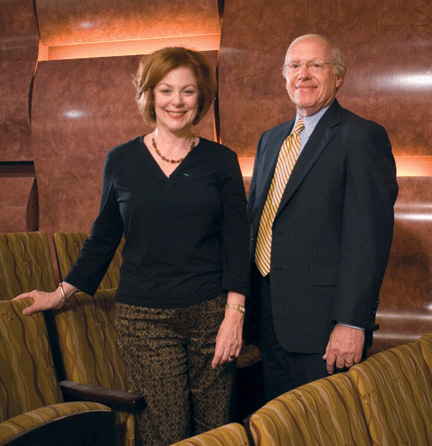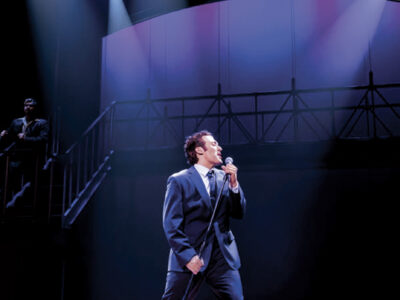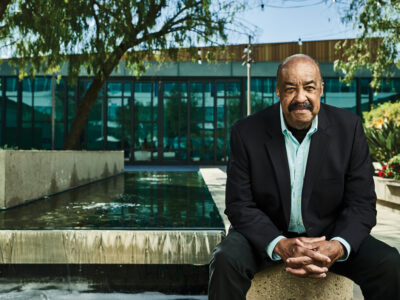
Class of ’60 | E. Gerald (Jerry) Riesenbach W’60 doesn’t seem like a man who is easily impressed, but you can hear the wonder in his voice as he recounts how the playwright Terence McNally responded when he was honored by the Philadelphia Theater Company (PTC) last year.
“At the end of the evening he came up on the stage to say thank you, and he talked about what a great experience he’s had working with us and working with Sara Garonzik, who is our artistic director,” Riesenbach recalls. “He then said, ‘I’m gonna do something right now that I hope you’ll all indulge me with. This is something I do in private before every show that opens, but I feel moved tonight and I want to do it now.’ And he kneeled down, and he kissed this stage. And everybody went ‘Whoa …’ It was like the Pope blessing the theater. It was just an amazing experience.”
Riesenbach, as it happens, played a major role in setting that floor in place, along with the rest of the building that the PTC, which specializes in premieres of new American plays, moved into last fall. (The McNally tribute doubled as its opening gala.) As president of the theater’s board of directors, he led the effort to plan, build, and pay for the company’s new home. Last month he was honored at its annual “Sweethearts Brunch,” a Valentines Day-themed fundraising event featuring live and silent auctions that usually raises between $250,000 and $350,000 for the company.
Though he was at first reluctant to be chosen, “they have basically twisted my arm on the theory that I’m finishing my role, and they felt that they wanted to honor me for my service as president of the Philadelphia Theater Company during its biggest growth period in its history, and I’m honored and I’m humbled by that,” he says.
Along with his family and Penn, Riesenbach names the theater as one of his three great loves. The first two have often overlapped. He met his wife on campus in 1957, he says, and two sons attended the University (their choice, he insists; he didn’t push). A recipient of the Alumni Award of Merit in 2004, Riesenbach is a past president of the Alumni Class Leadership Council (known as the “organized classes” until he led the switch to the new term) and spearheaded a heroic effort to update the Penn Alumni bylaws, among other volunteer services. In his day job he is a senior partner at the law firm Cozen O’Connor.
Riesenbach’s love of theater began when he was a child. His parents often took him to shows, he recalls, and he was president of his high-school theater club in Coatesville, Pennsylvania. He later became involved in the Philadelphia Arts and Business Council, which “tries to convince people that supporting the arts is important to the economic development of our community,” he explains. After a decade or so of service there, he was looking for a volunteer opportunity that would take advantage of the expertise he’d picked up. Somebody suggested that he consider the PTC.
Founded in 1974 as the Philadelphia Company, the PTC was staging its shows in rented space at the venerable Plays and Players Theater on Delancey Street, built in 1912. It was a “great little theater,” Riesenbach says, but run-down and distinctly lacking in amenities—such as conveniently located bathrooms. With the company’s audience diminishing every year, the theater’s board had a goal of acquiring a space of its own, but little sense of what was needed to accomplish it. Then Riesenbach joined up.
“Over a period of years we began to professionalize the board, bring more corporate people on, and we began getting a little more serious about this,” he says. After examining a variety of possible locations, they settled on a site on the section of Broad Street known as the Avenue of the Arts, partnering with the developer Carl Dranoff, who had acquired the site to construct a condominium project called Symphony House on Broad between Pine and Lombard streets. (Provision for an arts organization in the project was part of the deal for the land, which was owned by the city.)
Armed with a matching grant of $5 million from the state, Riesenbach and company went to work raising the other half, helped mightily by a gift (amount undisclosed) from Comcast founder Ralph Roberts W’41. The theater would be named for Roberts’ wife, Suzanne, an actress, director, and playwright who “has been involved with the theater her whole life,” Riesenbach says.
Originally budgeted at $10 million, the theater’s price tag increased to $25 million, mostly because of skyrocketing construction costs. So far, $22 million has been raised, says Riesenbach, who has moved into a new post as chair of the board and capital campaign, where his job is to help raise the balance.
Designed by Kieran-Timberlake, the Philadelphia-based architecture firm headed by alumni Stephen Kieran GAr’76 and James Timberlake GAr’77 [“A Passion for Putting Things Together,” Nov|Dec 2003], the Suzanne Roberts Theatre features a 365-seat proscenium theater, state-of-the-art lighting and film/video facilities, and a spacious lobby and mezzanine with sweeping views of the city through its mostly-glass façade fronting on Broad Street. Its steel-frame construction insulates it from noise and vibration—no small achievement, given the subway line running beneath Broad Street.
“The design has been spectacular; it’s a great space,” says Riesenbach. “The theater has been very highly received. We have had set designers and playwrights and Broadway actors who have just raved about coming here.”
The company’s first season in its new home concluded with The Happiness Lecture by Bill Irwin, the modern-day clown and vaudevillian; the PTC commissioned him to create the work especially for the space. The second season opened in October with the world premiere of McNally’s Unusual Acts of Devotion, starring Faith Prince and Richard Thomas. “They both said they would love to come back to it; it was a terrific experience,” Riesenbach says. Acts was the sixth of McNally’s plays to have its world or Philadelphia premiere at the PTC, including his Tony-award winning Master Class.
The emphasis on new plays by American writers is one of the PTC’s great strengths, says Riesenbach. “It produces plays by American playwrights only. And we produce plays that are Philadelphia or world premieres.”
He also points with pride to the company’s educational offerings, which include “seminars and programs and discussions and talk-backs,” as well as study guides produced in conjunction with the Philadelphia School District.
The PTC’s education staff and freelance assistants “go into the classroom and work with the teachers to teach, to have the kids read the play, read the study guide,” Riesenbach explains. “We have student matinees at 11 o’clock in the morning during all of our runs. All of the actors are part of a talk-back with the students. We involve them with a lot of different aspects of the theater. The idea is not to make them theater people, but to use theater to help them in literacy and other things.” This year the company’s educational program won a Barrymore Award (Philadelphia’s version of the Tonys) for community service.
According to Sara Garonzik, Riesenbach’s tenure as board president represents “an extraordinary four-year period” in the company’s existence.
“There is absolutely no question that we could not have achieved what we did without his leadership, wisdom, and professional skills,” she adds. “The speed at which we built our new $25 million home was unprecedented in our region, but Jerry’s innate determination and optimism muscled the whole project through and gave our theater the confidence to succeed.”
His efforts for the PTC have been “one of the joys in my life,” Riesenbach says. “I’ve done a lot of things in the community over the years. Having the opportunity to build something that would last long after I’m gone was something that I always wanted, and I’m very proud to have been able to do that.”
—J.P.




